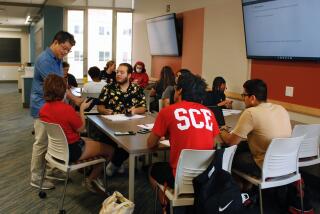College Freshmen More Stressed Than Ever, Poll Finds
- Share via
America’s college freshmen are more stressed out than ever before, worrying about making ends meet and completing all of the tasks confronting them, a nationwide survey shows.
Young women were nearly twice as likely as young men to report they felt stressed--a gender gap that the survey’s authors chalk up partly to lifestyle.
Women were more often preoccupied with stress-inducing pursuits of household chores, volunteering and studying, while men spent more time in relaxing activities: exercising, partying, watching TV and playing video games.
Combining both sexes, a record 30.2% of freshmen felt “frequently overwhelmed by all I have to do,” continuing an upward trend that has shown stress levels nearly doubling since the survey first asked the question in 1985.
Money worries seem to be a contributing factor. A record 24.7% of freshmen reported either “some” or a “very good” likelihood that they will have to work full time while in college.
“This is a reflection of an increasingly fast-paced society,” said Linda J. Sax, a UCLA education professor and director of the 34th annual survey.
“Students feel more competition, they’re applying to more colleges than ever before, they’re worried about having to work during college. They are stretching themselves too thin with so many activities.”
Still, the annual American Freshmen Survey, the nation’s oldest and most comprehensive assessment of student behavior and attitudes, had some positive trends to report:
* Freshmen who smoke cigarettes dropped for a second consecutive year, to 14.2%, after a long and steady climb since the early 1980s. Some students think the anti-smoking message is coming through; others point to increases in the price per pack. “It’s an expensive habit to keep,” one freshman said.
* Frequent or occasional beer drinking also continued a downward slide. Slightly more than half of freshmen said they drank beer at least occasionally in the past year. But the question doesn’t examine the growing problem of hard-core binge drinking on some campuses.
* Interest in becoming elementary or high school teachers rose to its highest level in more than 30 years--a hopeful sign to leaders who are worried about the nation’s upcoming teacher shortage. A record 15.7% of women and 5.6% of men said they planned a career in education.
The survey based its results on the responses of 261,217 freshmen at 462 colleges and universities, statistically adjusted to represent the 1.64 million first-time college freshmen in the United States. The survey is a joint project of the American Council on Education and UCLA’s Higher Education Research Institute.
Most freshmen fill out the survey as they enter their freshman year, so often the responses reflect back on their senior year in high school.
Incoming freshmen reported that grade inflation rages in high schools across America. A record 34.1% of college freshmen said they finished high school with an A average, compared with 32.4% in 1998 and a low of 12.5% in 1969. At the same time, only 12% of freshmen reported a C average or lower, compared with 13.4% in 1998 and 32.5% in 1969.
“There is no evidence that students are achieving at higher levels than in the past,” Sax said. Students and their parents are more likely to pressure teachers for higher grades than in years past, she said, and teachers are more likely to give in to their demands.
In one new development, political apathy, which reigns supreme on most college campuses, has finally halted its steady climb.
For the first time in years, entering freshmen said they were more likely to discuss politics and think it is important to keep up to date with political affairs.
Sax attributes the slight resurgence in political interest to President Clinton’s affair with White House intern Monica Lewinsky.
Melissa Gulick, a freshman at Loyola Marymount University in Westchester, confirmed that Clinton action’s caught her attention.
“I sure don’t want to see that happen again,” said the 18-year-old from Woodland Hills. “We’re just starting to vote. We want to know who we are voting for.”
For the first time, the survey asked students if they believe “people have a right to know about the personal lives of public figures.” Only 27.4% agreed with that statement, with a slightly higher proportion of men than women favoring such full disclosure.
When asked about stress, nearly 39% of women said they felt frequently overwhelmed, compared with 20% of men.
More than two-thirds of women reported studying more than three hours a week, while barely half of men were as studious. But activity level turns around when it comes to playing video games, exercising or just having a good time. About 54% of college men reported “partying” more than three hours a week, while 47.5% of women spent that much time partying.
The difference between the sexes seems about right to Casey Hannegan, a freshman business major at Loyola Marymount University.
His dorm, for men, faces the women’s dorm. He watches his brethren relaxing on the grounds between the buildings. They’re chipping golf balls, throwing a football or tossing a Frisbee. No women are in sight.
“I came here with my girlfriend, who is also a freshman,” Hannegan said. “She feels she has to work extra hard. She feels overwhelmed, even more than me. She is very stressed.”
Shirley St. Peter, director of counseling and psychological services at Cal State Fullerton, said the freshmen study’s findings mirror those done in the real world. “It saddens me, but doesn’t surprise me, that freshmen men and women have that split,” she said.
James Cones, clinical services director at the UC Irvine counseling center, said he personally hadn’t observed the same gender split, but agreed students today are under more stress, mainly because they’re trying to do more.
Besides keeping up their grades, he said, students are trying to do the extracurricular activities that look good on job and graduate school applications.
Instead of engaging in relaxing leisure activities at school on weekends, the clinical psychologist said, many students go home to work in family businesses.
Anna Skor, 18, of Santa Monica lives the life of a frenetic university student. Sure, she was stressed last year during the hyper-competitive college admissions process.
Now successfully enrolled in UCLA, her schedule is more booked than ever. The premed student juggles 18 units of course work with 20 hours a week working as a restaurant hostess. Her classes are huge, the professors unfamiliar and they grade on a curve. “Only so many succeed,” she said.
No matter what she does, it never seems enough.
“There’s the fear of what you need to do get into medical school, such as the necessity of doing volunteer work,” Skor said. “I always volunteered in high school. It’s hard to find five hours a week now.”
(BEGIN TEXT OF INFOBOX / INFOGRAPHIC)
Growing Freshmen Stress
% of freshman who felt “frequently overwhelmed by all I have to do.”
1999:
Men: 20%
Women: 38.8%
* Source: Higher Education Research Institute, UCLA






